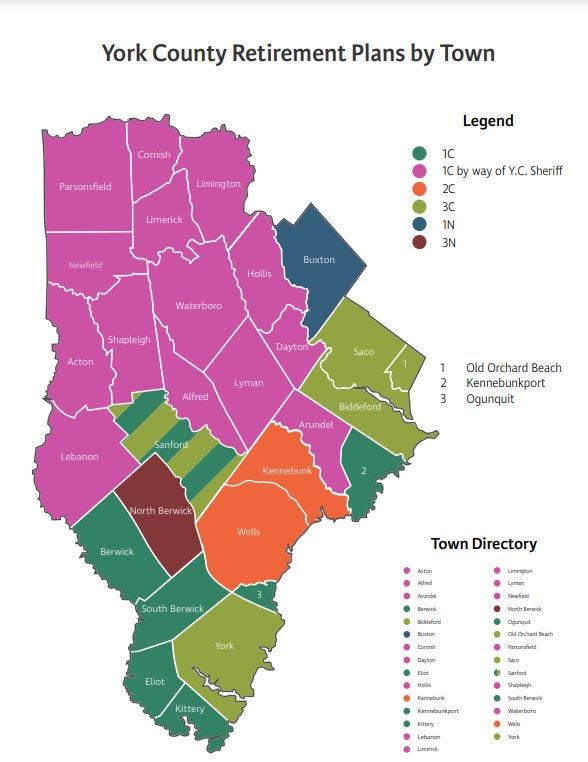Should Kennebunk reduce police, fire retirement service to 20 years? Case made to voters
KENNEBUNK, Maine — Voters may feel a tinge of déjà-vu as they answer one particular question on the municipal ballot on Nov. 8.
The town is asking voters to approve a change in its retirement plan for eligible employees in the local police and fire departments. If approved, police and fire employees would become eligible to retire, with half pay, after 20 years of service. Currently, the required time of service is 25 years.
This request should ring a bell. Voters rejected this very proposal during the annual town meeting in June. When voters cast their ballots next month, however, they will notice something different this time around.
In June, the town’s Budget Committee did not recommend passage of the proposal. Now, the board does recommend approving it — giving the article a unified front comprised of the town’s administration, the Select Board and Budget Committee, the police and fire chiefs, and the presidents of the local police and firefighter unions.
Earlier this week, Police Chief Bob MacKenzie, Fire Chief Justin Cooper, and Police Detective Steven Borst and firefighter Taylor Richardson, the presidents of the local police and firefighter unions, respectively, met and discussed their hopes that voters will join them in supporting a new retirement plan.

Back to the drawing board
When the proposal failed in June, town and union officials scratched their heads — every other financial proposal on the ballot had passed – and went back to the drawing board. According to MacKenzie, the group determined two factors: the question had been posed in vague legalese on the ballot, and town and union officials had not done enough to educate local boards and voters about what they were requesting and why.
Since June, the officials and union reps have appeared before the budget board and have sought interviews with local journalists to inform the public about the proposed changes.
Currently, under the Maine Public Employees Retirement System — MainePERS — Kennebunk is classified as 2C, the status allowing for retirement at half-pay after 25 years on the job. The article on next month’s ballot seeks to change that status to 1C, which allows for retirement with those benefits at 20 years.
If passed, the town will need to purchase prior service credits to bring longtime employees in line with the same 1C retirement benefits as newly hired ones. According to Finance Director Joel Downs, the town has three approaches it can consider to meet that expense.
The town could choose to have MainePERS finance the expenses of those credits, which would break down to payments of $159,000 per year for 14 years, for a total of $2.31 million. This amount would include an extra $79,000 to cover a half-year payment for the last six months of fiscal year 2023, according to Downs.
The town could instead choose to make a one-time payment to MainePERS through bonding $1.5 million – an amount that is roughly $100,000 less than projected in June. Or, Downs said, the town could have MainePERS finance the overall expense, with the town choosing to refinance sometime in the future.
If the proposal passes this time around, it would result in roughly an increase of 6 cents per thousand of property valuation for taxpayers, according to MacKenzie. He added that it would be more expensive for taxpayers in the long run if the Police Department keeps hiring and training a revolving door of new employees.
Borst described the proposed bonding as a “one-time” expense, versus the recurring cost of roughly $70,000 to hire, pay, train and equip individual new officers.
“How many times do you want to see 70-grand walk out the door?” he asked.
Dreams come true: Kennebunkport Heritage Housing Trust making homes 'attainable'
Two reasons why change is sought
The police and fire departments want these changes in the retirement plan for at least two reasons: recruitment and retention. They want both departments to be attractive to prospective new hires, and they want to keep those new officers and firefighters once they’re on board.
Borst presented a color-coded map of York County that shows why the town’s police and fire departments currently are finding recruiting and retaining challenging. The map shows that most communities in the county offer the 20-year, half-pay plan to their first responders. Only Kennebunk and Wells offer the 25-year plan.
“It’s a critical time for us,” MacKenzie said. “When you look at all the other towns in York County, we are only one of two towns that have the current plan.”

The town’s new fire chief is an example of efforts to recruit and retain. Earlier this year, Cooper successfully applied to succeed Jeffrey Rowe as chief of Kennebunk Fire Rescue. On Monday, Cooper said one of the reasons he applied for the position was that he felt hopeful that voters would approve the 20-year retirement plan in June. The town officially inducted Cooper as the Fire Department’s top official on June 14 – the very day on which voters decided not to approve the proposed new retirement plan that Cooper had found attractive.
The mane event: Ogunquit selectman shaves head to raise $180K to help kids with cancer
For Cooper, this was an awkward and unfortunate development, as the retirement plan at the job he had just left was superior to the one he had just accepted.
“Here I am, faced with a plan that’s not as good as the one I was in,” Cooper said. “Now I personally find myself in limbo.”
Indeed, Borst said potential police officers and firefighters are “shopping around” to see which community offers the best hourly wage and benefits and retirement packages.
“Today, it’s an applicant’s market,” he said.
MacKenzie said a single open position would bring in as many as 100 applicants when he first joined the local Police Department in 1989. Today, the situation is the opposite: four months of advertising vacant positions did not produce a single applicant, he said.
“Think about that,” MacKenzie added. “That’s where we are.”
Borst said he knows of people who are waiting to see if the retirement proposal passes on Nov. 8 before they apply for any vacant police positions in Kennebunk.
York County housing market cooldown?: High interest rates may deflate boom to 'new normal'
Stress, long days and low morale
In the meantime, the staffing shortages at both departments have added to the stress of current officers and firefighters who have to work longer and harder to pick up the slack.
“That really affects the overall morale,” Cooper said.
Borst said the number-one stressor he hears about from his fellow union members is the number of hours they have to work to cover gaps or emergencies in shift schedules. An officer scheduled to work a 10-hour shift, for example, could end up working 12 hours or more and be expected to come in early the next day.
Borst said MacKenzie is “trying like hell” to figure out how to minimize these occurrences. He added that a current trial period of four-day, 10-hour shifts per workweek is alleviating the issue somewhat, but the impact of extended shifts still needs to be resolved for the sake of employees and their families.
“There’s only so many times that this job is going to take, take, take, take, take before you need to address it,” he said.
MacKenzie said the Police Department needs to hire two new officers in order to be fully staffed – or three, if you take into account one employee who is currently on leave.
Cooper said his department is struggling to staff per-diem employees, making it difficult to realize the potential of a federal Staffing for Adequate Fire and Emergency Responses (SAFER) grant Kennebunk received for hiring full-time firefighters.
Allowing first responders to retire after 20 years instead of 25 helps decreases hazards to mental and physical health by five years, according to the town officials and union presidents. Cooper said firefighting entails “cumulative stresses and traumas.” Firefighters also face higher risks of cancer, given the carcinogens they face when battling blazes.
“If you can take five years off that, that’s an exponential amount of cumulative stressors that we can relieve people from having to see,” Cooper said. “Our jobs are very physical. We get musculoskeletal injuries. Throughout time, it gets exponentially more as you get older. It’s just a natural thing: you’re more inclined to get injured doing the same physical jobs.”
And when it comes to firefighters, recovery from such injuries take longer, Cooper noted.
“We can’t just come back to work,” Cooper said. “If you break a bone or sprain something, or you’ve hurt your back, (you) can’t just come back to work and work a desk. Our job is physical. You have to be cleared for duty to be able to do that stuff.”
Covering injuries and treating diseases through a health plan gets “very expensive,” Cooper added.
Cooper acknowledged the money it will take to cover those credits if the new retirement plan is approved. But he also noted that town officials and voters recently supported spending money for a new ladder truck for his department.
“We have to invest in human capital, as well,” he said.
Doing so would result in something that both local police officers and firefighters are craving, according to Borst.
“Relief,” he said.
This article originally appeared on Portsmouth Herald: Kennebunk ME looks to reduce police, fire retirement to 20 years

